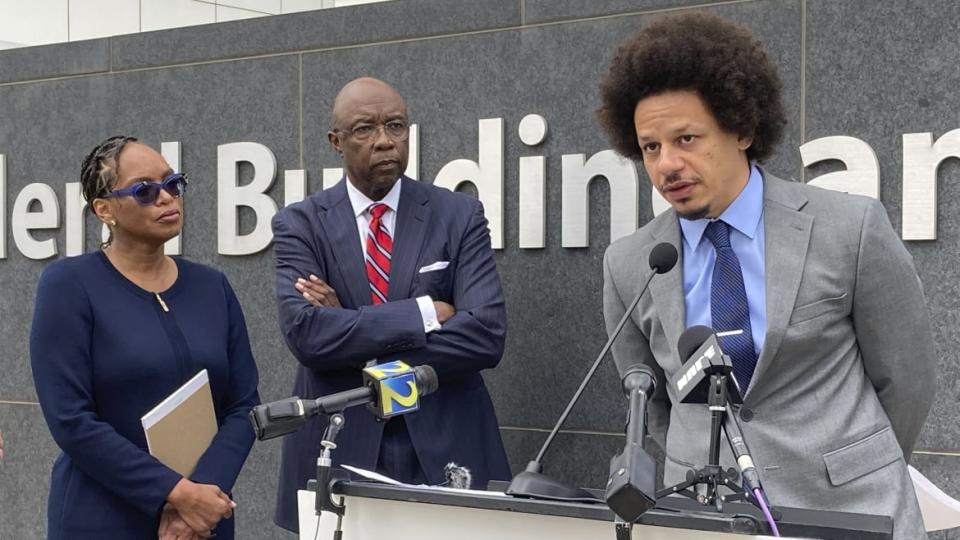Eric Andre: Police Stopped Me for Flying While Black. I’m Suing. Here’s Why.

Last year, I was steps from completing what is, for most Americans, a mundane part of air travel—walking down the jet bridge from the airport gate to the plane—when the police stopped me.
They didn’t have any reason to stop me (a fact they have admitted). It’s just part of Flying While Black.
Shortly after I entered the jet bridge, two police officers stepped in front of me, blocking my path. They started rapid-fire questioning: Was I carrying any illegal drugs? Cocaine? Meth? Pills? Why was I traveling? Could they see my ID?
I didn’t see any other Black people boarding at that time.
The officers were part of a local Clayton County Police drug interdiction task force, whose job it is to lurk at the end of jet bridges and accost unsuspecting passengers. Police call these passenger encounters “consensual.” That’s based on the fiction that passengers have the power to ignore the officers and their questions, even though officers have chosen the exact place and time—passing through the narrow jet bridge—when passengers will feel least free to ignore them.
We all learn that airport security is important and we should obey officers. They never inform passengers they have a right to simply ignore them, and it is hard to imagine people choosing to do so. And then there is the fact that people of color are drilled repeatedly about the dangers of ignoring police “requests.”
The Only Late-Night Show Crazier Than a Trump Rally
The officers who stopped me that day at Hartsfield-Jackson Atlanta International Airport did not know who I was. They had no reason to suspect me of any crime. When I asked why I was being singled out, I was told what Black men are told every day by police: that it was a “random” search.
Right.
It was no coincidence that I was singled out from a procession of white passengers. I learned later that in the months before my stop, more than 56 percent of passengers the task force stopped were Black, even though Black people comprise only 8 percent of domestic air travelers.
What are the odds that such a racial disparity could result from random chance? Less than one in a hundred trillion.
Soon enough the encounter was over, and I was boarding the plane. So, no big deal, right? Wrong. During those few minutes, the other (white) passengers were forced to shimmy around me. They gawked while doing so—after all, I must have done something to deserve all the police attention. I boarded the plane utterly humiliated, and angry.
This was not my first experience with racial profiling. It wasn’t even my first experience with racial profiling in an airport. But it was the most blatant. And the encounter has stuck with me ever since. It’s an all-too-personal reminder of just how much work remains to end so-called “consent” stops and racial profiling, key tools in the failed War on Drugs, which has poisoned police-community relations, filled this nation’s prisons, and broken Black families apart.
Beyond its offensiveness, consider just how ridiculous this police stop was. Clayton County Police were targeting Black men for drugs in one of the least likely places in America to, well, find drugs—an airport, a building of 24/7 surveillance where officers scour bags for excessive toothpaste and there are more cameras than on the TV set I’d just left. By the time I had reached the jet bridge, my body had already been scanned head-to-toe, my bags X-rayed, my identity confirmed multiple times.
So, it’s no surprise that the Clayton County task force finds almost no drugs on jet bridges. Of the 402 stops my legal team has examined, only one resulted in an arrest.

Eric André speaks at a news conference outside the federal courthouse in Atlanta on Tuesday, Oct. 11, 2022, as his attorneys Allegra Lawrence-Hardy, left, and Richard Deane watch.
In fact, my lawsuit argues that the program isn’t designed to seize drugs at all—instead, it’s to seize cash from air travelers.
Programs like the one at the Atlanta airport have existed for generations to fuel this country’s War on Drugs. Targeting Black passengers keeps the cash flowing, the cash keeps the War on Drugs going, and the War on Drugs keeps communities of color from thriving.
This week, I sued Clayton County to expose and end this program and help break that cycle. Together with The Policing Project at NYU School of Law, I have asked a federal court to find that the jet bridge stop violated two core constitutional rights: to be free from unreasonable searches and seizures, and free from racial discrimination in policing.
I hope my lawsuit also illuminates how pervasive these police practices are—how often they occur, who is engaging in similar programs, and what role, if any, airlines have played.
This lawsuit probably won’t end what police continue to call “consensual stops,” and it almost certainly won’t end racial profiling in greater Atlanta—these practices are too entrenched in law enforcement. But it’s crucial that these unlawful practices be brought to light, called out for what they are, and that we work to end them wherever we can.
For more, listen to Eric Andre on The Last Laugh podcast.
Get the Daily Beast's biggest scoops and scandals delivered right to your inbox. Sign up now.
Stay informed and gain unlimited access to the Daily Beast's unmatched reporting. Subscribe now.

